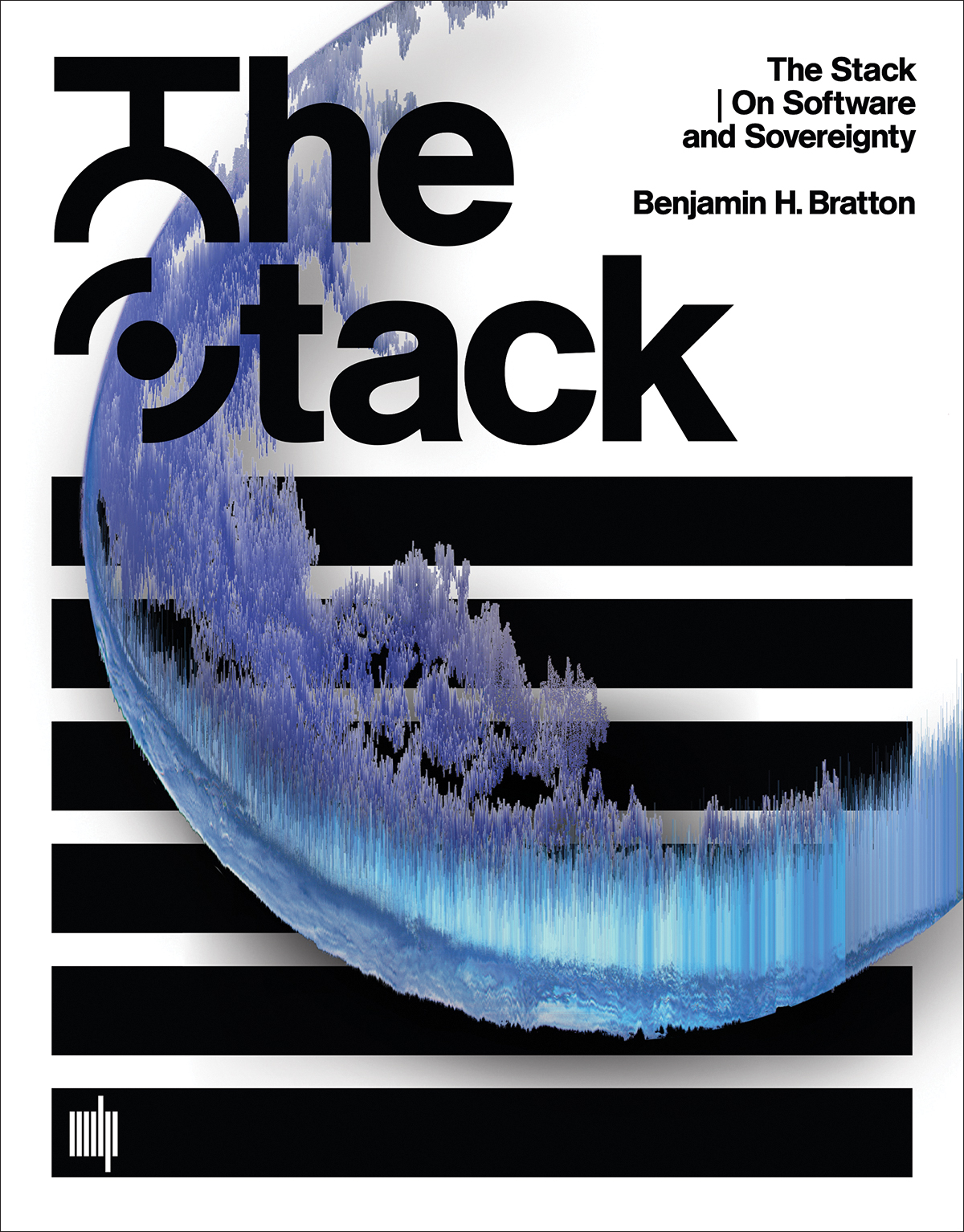Benjamin H. Bratton: The Stack: On Software and Sovereignty (2016)
Filed under book | Tags: · architecture, automation, city, cloud computing, computation, earth, geopolitics, infrastructure, interface, internet of things, software, software studies, technology, theory

“What has planetary-scale computation done to our geopolitical realities? It takes different forms at different scales—from energy and mineral sourcing and subterranean cloud infrastructure to urban software and massive universal addressing systems; from interfaces drawn by the augmentation of the hand and eye to users identified by self—quantification and the arrival of legions of sensors, algorithms, and robots. Together, how do these distort and deform modern political geographies and produce new territories in their own image?
In The Stack, Benjamin Bratton proposes that these different genres of computation—smart grids, cloud platforms, mobile apps, smart cities, the Internet of Things, automation—can be seen not as so many species evolving on their own, but as forming a coherent whole: an accidental megastructure called The Stack that is both a computational apparatus and a new governing architecture. We are inside The Stack and it is inside of us.
In an account that is both theoretical and technical, drawing on political philosophy, architectural theory, and software studies, Bratton explores six layers of The Stack: Earth, Cloud, City, Address, Interface, User. Each is mapped on its own terms and understood as a component within the larger whole built from hard and soft systems intermingling—not only computational forms but also social, human, and physical forces. This model, informed by the logic of the multilayered structure of protocol “stacks,” in which network technologies operate within a modular and vertical order, offers a comprehensive image of our emerging infrastructure and a platform for its ongoing reinvention.
The Stack is an interdisciplinary design brief for a new geopolitics that works with and for planetary-scale computation. Interweaving the continental, urban, and perceptual scales, it shows how we can better build, dwell within, communicate with, and govern our worlds.”
Publisher MIT Press, 2016
Software Studies series
ISBN 9780262029575, 026202957X
xx+502 pages
Reviews: Mercedes Bunz (Media Culture Society, 2016), Roger Whitson (2016), Marc Tuters (Computational Culture, 2017).
Commentary: McKenzie Wark (Public Seminar, 2016), Lukáš Likavčan (Hong Kong Review of Books, 2017; Artalk, CZ).
Jorge Ribalta: Universal Archive: The Condition of the Document and the Modern Photographic Utopia (2008) [CA, ES, EN]
Filed under book, catalogue | Tags: · archive, barcelona, city, documentary photography, history of photography, photography

“This guide has been published on the occasion of the exhibition Universal Archive. The Condition of the Document and the Modern Photographic Utopia (2008-09) that analyses the idea of a document in the history of photography on the basis of the study and staging of a number of debates about the genre during the 20th century. With the aim of assessing various hypotheses about the meanings and mechanisms of the documentary, it traces a historical itinerary that gets under way with the beginning of the hegemony of photography in the illustrated press in the first third of the 20th century, before arriving at the purported crisis of photographic realism in the digital era at the end of the century. For all that, the exhibition is not a history of the genre, nor does it exhaust its possible definitions, but instead attempts to study how the photographic document has been constituted — in a consistently ambivalent and polemical way — in certain historical contexts. ”
Publisher Museu d’Art Contemporani de Barcelona (MACBA), Barcelona, 2008
ISBN 9788489771703
99 pages
via MACBA
Exhibition reviews: Max Andrews (Frieze 2009), David Evans (Photography & Culture 2010), Art Tattler (n.d.).
Arxiu universal (Catalan, 2008, PDFs)
Archivio universal (Spanish, 2008, PDFs)
Universal Archive (English, 2008, PDF, 3 MB)
Saltwater: A Theory of Thought Forms (2015) [English/Turkish]
Filed under catalogue | Tags: · art, city, contemporary art, form, istanbul, science, theory

Catalogue for the 14th Istanbul Biennial, held 5 September – 1 November 2015 and curated by Carolyn Christov-Bakargiev.
“Saltwater: A Theory of Thought Forms hovers around a material – salt water – and the contrasting image-forms of knots and waves. It looks for where to draw the line, to withdraw, to draw upon, and to draw out. It does so offshore, on the flat surfaces with our fingertips, but also in the depths, underwater, before the enfolded encoding unfolds.
This city-wide exhibition on the Bosphorus considers different frequencies and patterns of waves, the currents and densities of water both visible and invisible that poetically and politically shape and transform the world. With and through art, we mourn, commemorate, denounce, try to heal, and we commit ourselves to the possibility of joy and vitality, of many communities that have co-inhabited these spaces, leaping from form to flourishing life.”
With essays by Emin Özsoy, Aurora Scotti, Jean-Michel Vappereau, Griselda Pollock, Pietro Rigolo, Beatriz Colomina, Boris Groys, Alexander Provan, Andrew Yang, Vilayanur S. Ramachandran, Elvan Zabunyan, Penelope Deutscher, Adrian Parr, Bracha L. Ettinger, William Irvine, Chus Martínez, Jeffrey Peakall, Orhan Pamuk, and an anthology edited by Ingo Niermann.
Drafted by Carolyn Christov-Bakargiev
Edited by Süreyyya Evren
Publisher Istanbul Foundation for Culture and Arts and Yapı Kredi Publications, Istanbul, 2015
Open access
ISBN 9786055275259, 6055275252
lxii+540 pages

